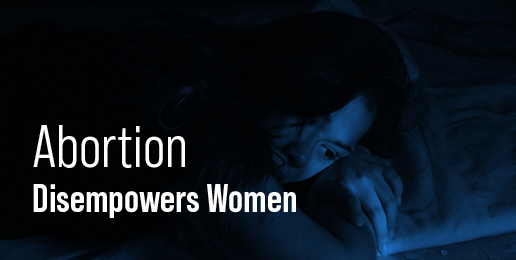
Accessible abortion gives women power, or so they say.

As they put it, a baby on the way potentially jeopardizes a woman’s professional career or even her social life.
In short, if women aren’t able to decide when to—excuse the euphemism—”terminate their pregnancies,” then they are necessarily reduced to second-class citizens who cannot control their future.
This rationale has even made it into Supreme Court opinions. Planned Parenthood v. Casey, the 1992 case that reinforced Roe v. Wade, held that
“[t]he ability of women to participate equally in the economic and social life of the Nation has been facilitated by their ability to control their reproductive lives.”
And just last year, in their blistering dissent in Dobbs v. Jackson (2022), Justices Breyer, Sotomayor, and Kagan hammered the point home:
“Without the ability to decide whether and when to have children, women could not . . . determine how they would live their lives, and how they would contribute to the society around them.“
This characterization of abortion appeals to many people. For those who want to see women achieve their status as equal citizens, legal abortion seems liberating. It seems to give women an easily accessible option for ensuring that children don’t interfere with their other goals.
In short, abortion gives women the power to start a family only when they want to.
But what if there’s another side to this story?
I’m going to posit a radical idea for a second: what if abortion actually removes many women’s power to start a family when they want to?
Sound far-fetched? That’s alright; I think I’d be backed up—at least somewhat—by Janet Yellen, the pro-choice current U.S. Secretary of the Treasury. As a matter of fact, I got this idea from an article she published four years after Casey.
In 1996, a team of economists, including Yellen, published a paper in Oxford’s prestigious Quarterly Journal of Economics that examined how the prevalence of abortion and contraceptives affected relationships between romantic partners. Titled “An Analysis of Out-of-Wedlock Childbearing in the United States,” the study showed that the increased availability of abortion actually pressures women to engage in premarital sex without asking for a guarantee of marriage in the event that they conceive!
In other words, accessible abortion removes from women their leverage over men who are interested in them; once abortion became widely available, women no longer had the power to demand the protection of marriage in the event of a pregnancy.
Here are some of the main plot points of the study:
- Before the mass availability of abortion and contraceptives, cultural expectations demanded that if a woman got pregnant out of wedlock, the man was obligated to offer to marry her in a hasty “shotgun marriage.” As one interviewee put it, ‘If a girl gets pregnant you married her. There wasn’t no choice. So I married her’ (p. 279).
- During this era, it was often the norm that women would ask for a promise of marriage—in the event she conceived—before engaging in sexual activity.
This societal expectation protected women who would otherwise be left with the emotional heartbreak of abandonment combined with the burdensome responsibility of raising a child on their own.
It gave women leverage and power over men who were interested in them for purely selfish reasons. (Just to be clear, extramarital intimacy is never acceptable in the first place, and this analysis by no means commends it. But I think we’ll all agree that for those who got themselves in such a situation, marriage is a powerful solution.)
- Once abortion and contraceptives became widely accessible, however, the cultural norm turned on its head: now, instead of the woman asking the man for a guarantee of marriage, the man can ask the woman to get an abortion.
And this request now has a good deal of credibility; while formerly, the request for a back-alley procedure would have sounded unreasonable, now there is a nice clean clinic down the road that can do it legally.
- Thus, pregnancy has transitioned from being a problem for the couple—resolved through marriage—to being a problem for the woman alone.
After all, her choice, her responsibility. As one contributor to a dad’s rights newsgroup admitted openly,
“Since the decision to have the child is solely up to the mother . . . I don’t see how both parents have responsibility to that child” (p. 281).
- It only gets worse from here. A woman who may have qualms about premarital sex—but who wants a romantic relationship with a man—might feel like she can’t ask for a marriage guarantee. If she does, her man can just leave her for some other girl who’d be willing to get an abortion. Since this woman doesn’t want to lose her man, she feels pressured to please him in an uncommitted relationship before he leaves her for someone else.
Now, instead of the woman having leverage over the man—which protects the woman by forcing the man to be attentive to her needs—the man has leverage over the woman. “Either comply with my (now) reasonable request to get an abortion (it’s legal, after all) or I’ll leave you for someone else.”
Instead of a “no marriage, no relationship” ultimatum dictated by the woman, it now is a “no abortion, no relationship” ultimatum dictated by the man.
And in this situation—contrary to those who tout abortion as a woman’s free choice—this ultimatum is hardly a “free choice” when the entire relationship hangs in the balance. As the authors put it,
“[T]he woman’s decision whether or not to abort depends on her perceived probability that the man will marry her if she carries the baby to term” (p. 301).
This is a side of the story no one ever talks about.
Everyone focuses on how accessible abortion gives women the power to avoid a family burden when they don’t want it, but no one ever talks about how accessible abortion strips women of the power to demand family security when they need it.
I wonder what Janet Yellen would say about her pro-choice stance, given that her own research has exposed that legal and accessible abortion, commonly praised as a “right” based on “choice,” actually spawned a system that removes protections from women and opens them up to predatory relationships.






















